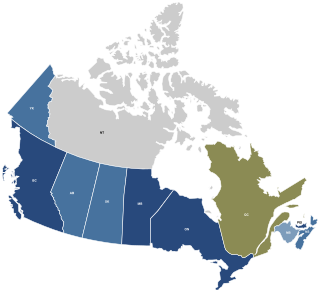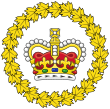A referendum is a direct vote in which an entire electorate is invited to vote on a particular proposal. This may result in the adoption of a new law. In some countries, it is synonymous with a plebiscite or a vote on a ballot question.
National referendums are seldom used in Canada. The first two referendums saw voters in Quebec and the remainder of Canada take dramatically opposing stands, the third saw most of the voters take a stand dramatically opposed to that of the politicians in power.
The Charlottetown Accord was a package of proposed amendments to the Constitution of Canada, proposed by the Canadian federal and provincial governments in 1992. It was submitted to a public referendum on October 26 and was defeated.

The Société des alcools du Québec, often abbreviated and referred to as SAQ, is a provincial Crown corporation in Quebec responsible for the trade of alcoholic beverages within the province.
The Ontario Temperance Act was a law passed in 1916 that led to the Prohibition of alcohol in Ontario. When the act was first enacted, the sale of alcohol was prohibited, but liquor could still be manufactured in the province or imported. Strong support for prohibition came from religious elements of society such as pietistic Protestants, especially Methodists, seeking to eliminate what they considered the evil effects of liquor, including violence, family abuse, and political corruption. Historically, temperance advocates in Ontario drew inspiration from the movement in the United States.

The Canada Temperance Act, also known as the Scott Act, was an Act of the Parliament of Canada passed in 1878, which provided for a national framework for municipalities to opt in by plebiscite to a scheme of prohibition. It was repealed in 1984.
An Ontario prohibition plebiscite was held on January 1, 1894, in conjunction with municipal elections under the Prohibition Plebiscite Act, on the legality of alcoholic beverages and the implementation of prohibition. Though the plebiscite passed, the results were non-binding and prohibition would not occur in Ontario until 1916.
An Ontario prohibition referendum was held on December 4, 1902, under the Liquor Act, on the legality of alcoholic beverages and the implementation of prohibition in the province. Though the referendum passed, a majority of half of the voters in the 1898 election did not support the motion and prohibition was not introduced. Prohibition would not occur in Ontario until 1916.
An Ontario prohibition referendum was held on October 20, 1919, on the repeal of the prohibition of alcoholic beverages. Prohibition had been passed by the provincial government in 1916 under the Ontario Temperance Act, though a clause required a referendum to be held on the issue after three years.
An Ontario prohibition referendum was held on April 18, 1921 concerning a ban on the importation of alcoholic beverages into Ontario.
An Ontario prohibition referendum was held on October 23, 1924 on the repeal of the Ontario Temperance Act. The referendum was brought about by a clause in the Act, which permitted the possible repeal of prohibition by a majority vote.
The Quebec referendum on the prohibition of alcohol, held on April 10, 1919, considered the legalization of the sale of beer, cider and wine in the province of Quebec, Canada. The 'yes' side won with 78.62% of the votes.
The 1923 Alberta prohibition plebiscite, held on November 5, 1923, was a province-wide plebiscite held in Alberta, Canada, to allow alcoholic beverages, triggered by an affirmative vote in the Legislative Assembly of Alberta, based on the presentation of a 56,000-name petition in accordance with the requirements of the Citizens Referendum Law, initiative law, in force at the time. Prohibition was defeated by nearly 58 percent (58%) of the vote.
Canadian Liquor Plebiscites were held on October 25, 1920 in the provinces of Alberta, Manitoba, Nova Scotia and Saskatchewan under the Canada Temperance Act and the Dominion Elections Act.

A plebiscite on conscription was held in Canada on 27 April 1942. It was held in response to the Conservative Party lobbying Mackenzie King to introduce compulsory overseas military service, the government having previously promised not to introduce same in 1940. The result was 66% voting in favour, with Quebec being the only province to have a majority voting against. Quebec's strong majority against the commitment's release prompted Mackenzie King not to pursue the issue until later events prompted a change in position.

The Dominion Alliance for the Total Suppression of the Liquor Traffic was an organization established in 1877 in Canada that lobbied for prohibition of alcohol. Membership was largely Protestant and Anglophone. The Dominion Alliance faced passive resistance from politicians concerned about the views of their constituents, particularly in Quebec, but had some success at the local level. Sale of alcohol was prohibited provincially and then nationally during World War I (1914–18). After the war the national and provincial temperance laws were repealed and the Dominion Alliance faded into irrelevance.

BC Liquor Stores are a chain of crown corporation retail outlets operated by the British Columbia Liquor Distribution Branch to distribute alcoholic beverages in the province of British Columbia, Canada. They are accountable to the Attorney General of British Columbia. BC Liquor Stores currently operate 196 locations across the province. The chain was established in June 1921, following the result of a plebiscite in favour of liquor availability through government liquor stores. Prior to the plebiscite, alcohol had been illegal through the Prohibition Act, introduced on May 23, 1916, with exceptions to sacramental, medicinal or industrial purposes.
A two-part plebiscite was held in British Columbia on 12 June 1952, alongside provincial elections. Voters were asked whether they approved of continuing with daylight saving time and allowing liquor and wine to be sold in licensed premises. Both proposals were approved.











